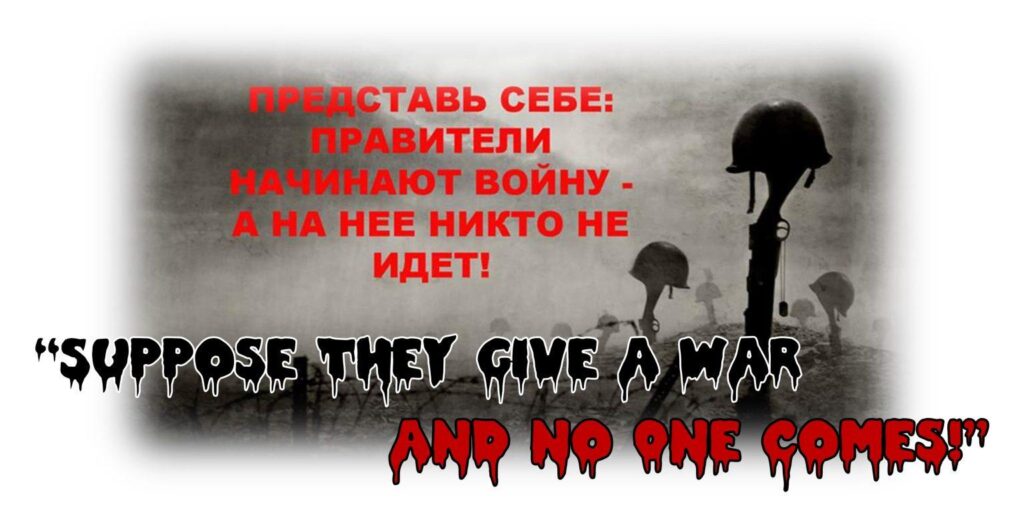How does the mobilization of soldiers take place in Putin’s Russia? What degree of coercion, harassment, and pressure do men of military age who are sent to the front have to face? How does the Russian population, and more specifically the working class, react to all this? Because we often ask ourselves such questions, we also asked an anarchist from Russia to get a clearer picture. He responded with a brief summary of the situation.
Censorship and war propaganda, introduced by Putin’s regime, seek to hide the shocking reality from the world. On the other hand, we can see pro-Ukrainian war propaganda, which describes the Russian population as a mass of loyal supporters of Putinism who are voluntarily rushing into war. Sometimes it is really difficult to see and understand reality in all its breadth. That is why we consider the testimony of our comrade from Russia to be a very practical tool that can be helpful to us.

Notes on the topic of mobilization in Russia
In general, it’s worth mentioning from the outset that Russians generally have a rather pacifist mentality. Ever since the Soviet era, many have repeated the words, “If only there were no war.” Many modern Russians have experienced collective trauma since the wars in Afghanistan and Chechnya. Popular songs have even been composed about this, reflecting the senseless deaths of yesterday’s schoolchildren. And many Russians categorically did not want to repeat this painful experience. Even those loyal to Putin’s rule (until 2022, of course) have used the argument that Putin supposedly “ensured a peaceful sky overhead.” It’s clear that there is a significant militaristic minority, and they currently enjoy a kind of information monopoly in Russia thanks to military censorship, but they are clearly not the majority.
Nevertheless, it’s also worth noting that the flip side of the Russian pacifist mentality is a negative trait known as philistinism. Russians are against war, but they are not prepared to actively oppose it. This is especially true in a situation where the government has imposed strict military censorship, imprisons people en masse for criticizing Russia’s military actions, and brutally disperses anti-war protests, arresting tens of thousands of people. Under these circumstances, the average Russian is more likely to keep a low profile and not express their point of view. This is precisely why many opinion polls claim high support for the war and Putin: however, this is false data, as those who are “for” have nothing to fear, while those who are “against” risk losing their freedom under the current regime. But what society is even less prepared to do is go directly to war. Putin understands this, and therefore is trying to conduct a less draconian mobilization than in Ukraine. It primarily affects the provinces, not Moscow, where publicity about war deaths will be minimal.
At the same time, Putin’s government is trying to implement it cunningly: it formally doesn’t send young men serving their mandatory military service to the front. But at the same time, these men, already drafted, are effectively forced to sign this contract. You know, humiliation, torture, and harassment of subordinates are widespread in the Russian army. There have been high-profile cases of young men dying during their mandatory service due to intolerable conditions or suffering injuries from beatings. All these men are effectively taken hostage and blackmailed into “voluntarily” going to war. There have also been cases of Russian authorities deceiving random people, persuading them to go off to supposedly “earn money,” and then, after signing fake documents, sending them to the front without even informing their loved ones.
Russians don’t want to go to war, so many of them don’t report to military recruitment offices; many also try to feign illness. For example, I know of a former classmate of mine who was an excellent student and managed to enroll in university. But after receiving his draft notice, he decided to break his leg… Many also prefer to avoid mobilization abroad, but the Russian government is now trying to close this option by 2026.
There have also been protests against mobilization, for example, in Dagestan. Separately worth noting is the movement of wives of mobilized soldiers, who have even come to protest at the Kremlin walls. This is especially noteworthy, considering that some of them initially supported the war but are now demanding the demobilization of soldiers. These were mostly peaceful pickets, which nevertheless attracted widespread attention.
There were also more violent forms of protest against mobilization, such as arson and attacks on military enlistment offices across the country. One such incident occurred in the city of Ust-Ilimsk, involving Ruslan Zinin. Ruslan Zinin, a logging truck driver from Ust-Ilimsk, lost his 19-year-old school friend Danil, who was serving his mandatory military service, at the very beginning of the war in March 2022. After mobilization was announced, Zinin learned that his cousin had received a draft notice.
On September 26, 2022, Zinin, fearing for the fate of his younger brother, went to the military enlistment office and, according to an eyewitness, tried to find out why his friend had received a draft notice even though he wasn’t serving in the army. In response, the military enlistment office insulted Zinin. Ruslan then returned to the military enlistment office again that same day, this time with a sawed-off shotgun, and opened fire. As a result, he was sentenced to 19 years in prison.